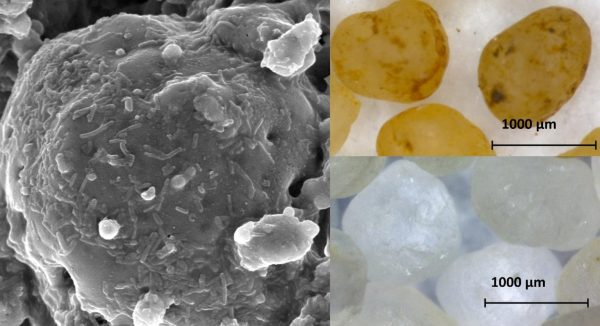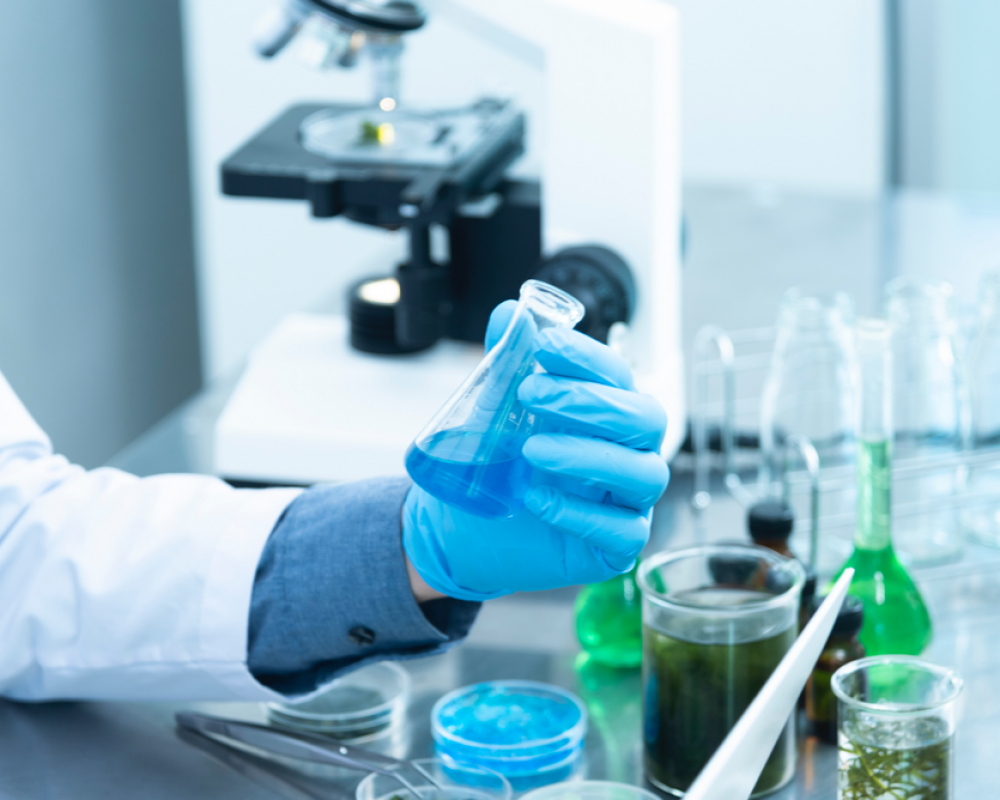
Exploring a hidden value of mining waste
ekolive s.r.o. is a biotech SME based in Kosice, Slovakia. The company was founded in 2018 by a group of experienced biotechnologists, geologists and business developers. Supported by the EIT Raw Materials programme, ekolive offers innovative bioremediation-based processes for recovery of metals from mining sites, called bioleaching (InnoBioTech™). The technology, aided by heterotrophic bacteria, provides a highly sought after solution to purify low-quality mineral deposits to increase their raw material value, accessibility and usability.

Scanning electron microscopy image of sand grain colonised by heterotrophic bioleaching bacteria (left). Images of sand grains before and after bioleaching application (top and bottom right, Image: ekolive).
A by-product from the bioleaching process is a liquor, known as a bioleachate. Previous studies suggested that this residue can be used as a biofertilizer and pesticide, delivering organic alternatives for safer food production. Ekolive’s CEO Darina Štyriaková spotted this as an opportunity that could benefit the company and the agriculture sector. To explore this idea further, Darina joined the KET4CP network – a platform that helps SMEs to solve their clean production challenges by connecting them with European technology centres (TCs).
Darina explained: We were introduced to the Biorenewables Development Centre (UK) and Bay Zoltán (Hungary). Together we applied for micro grant funding from the KET4CP which supported a collaborative project to explore the bioleachate properties.
The partners considered several aspects during the resulting KET4CP-funded project. The Bay Zoltán Nonprofit Ltd. for Applied Research technology centre focused on optimising the bioleaching technology to reduce the volumes and concentrate the liquor. The Biorenewables Development Centre (BDC) team performed a comprehensive analysis of bioleachate nutrients and tested the bioleachate’s potential for use as a biofertiliser and pesticide.

Basil plant growth study using various concentrations of bioleachate (Image: BDC)
The analysis showed the presence of important trace elements in the bioleachate required for healthy plant growth. Importantly, during a plant growth trial, the indicator plants treated with bioleachate showed a greater height and dry weight and reached the full development stage faster than the control (untreated) seedlings. These observations from the BDC study show a promising application for the bioleachate as a plant biofertilizer.
In addition, the antimicrobial properties of ekolive’s bioleachates were demonstrated against common bacterial plant pathogens, such as Erwinia amylovora and Pectobacterium carotovorum, reducing their counts by 99.99%. While further testing against a wider range of plant pathogens is required, this trial indicates potential for the bioleachate as a pesticide.
Deborah Rathbone, Bioscience Innovation Team Manager at the BDC, commented: Through the KET4CP funding, the BDC team was able to offer expertise and access to analytical equipment not available to ekolive. Our analytical assessment of the bioleachate as a biofertilizer and pesticide extended the company’s knowledge and provided some promising results to develop and commercialise a new product.
Szilárd Pércsi, Business Development Manager at Bay Zoltán commented: Our expertise in the process optimisation complemented research at the BDC, and the KET4CP platform provided a fantastic opportunity for ekolive to further develop the bioleaching technology which will enable a shift to a low carbon economy.
Bioleaching is bioremediation-based processes for recovery of metals from mining sites
Heterotrophic bacteria are used to purify low-quality mineral deposits
Bioleachate could be used as a fertiliser or pesticide
Notes to editors:
About KET4Clean Production (KET4CP)
KET4CP project (CSA No 777441) is funded under H2020-INNOSUP-03-07-08-2017 Technology services to accelerate the uptake of advanced manufacturing technologies for clean production by manufacturing SMEs. The project goal is Pan-European access for manufacturing SME on technology services for clean production through a network of premier KET Technology Centres with one-stop-shop access incl. Enterprise Europe Network (EEN) and discourse with policy makers on regional innovation strategy (RIS3). https://www.ket4sme.eu/

About Biorenewables Development Centre
The Biorenewables Development Centre (BDC) is an open-access R&D centre, based at the University of York, working at the interface between academia and industry to convert plants, microbes and biowastes into profitable biorenewable products. The BDC is part-funded by the England European Regional Development Fund as part of the European Structural and Investment Funds Growth Programme 2014-2020. The York, North Yorkshire and East Riding (YNYER) LEP awarded a grant of £1M to the BDC as part of the Local Growth Fund (LGF) support which funded the equipment used to carry out this project. For more information visit: https://www.businessinspiredgrowth.com/funding/local-growth-fund/

About Bay Zoltán
Bay Zoltán Nonprofit Ltd. for Applied Research (BZN) is Hungary’s largest public institution for applied research. Its mission is to support the development of sustainable competitive advantage for Hungarian companies through innovation services and technology transfer, in close cooperation with the private sector. The Institute’s foremost objective is to provide state of the art solutions to its national and international partners. http://www.bayzoltan.hu/en/welcome/

